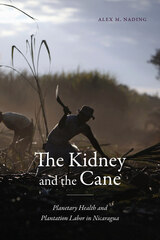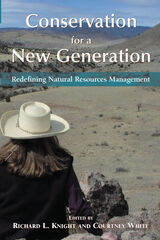
Conservation for a New Generation captures those efforts with chapters that explain the new landscape of conservation along with case studies that illustrate these new approaches. The book brings together leading voices in the field of environmental conservation—Lynne Sherrod, Curt Meine, Daniel Kemmis, Luther Propst, Jodi Hilty, Peter Forbes, and many others—to offer fourteen chapters and twelve case studies that
• demonstrate the benefits of government agencies partnering with diverse stakeholders;
• explore how natural resources management is evolving;
• discuss emerging practices for conservation, including conservation planning, ecological restoration, valuing ecosystem services, and using economic incentives;
• promote cooperation on natural resources issues that have in the past been divisive.
Throughout, contributors focus on the fundamental truth that unites human and land communities: as one prospers, so does the other; as one declines, so too will the other. The book illustrates how natural resources management that emphasizes building strong relationships results in outcomes that are beneficial to both people and land.
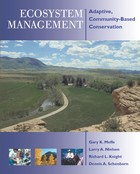
Today's natural resource managers must be able to navigate among the complicated interactions and conflicting interests of diverse stakeholders and decisionmakers. Technical and scientific knowledge, though necessary, are not sufficient. Science is merely one component in a multifaceted world of decision making. And while the demands of resource management have changed greatly, natural resource education and textbooks have not. Until now.
Ecosystem Management represents a different kind of textbook for a different kind of course. It offers a new and exciting approach that engages students in active problem solving by using detailed landscape scenarios that reflect the complex issues and conflicting interests that face today's resource managers and scientists. Focusing on the application of the sciences of ecology and conservation biology to real-world concerns, it emphasizes the intricate ecological, socioeconomic, and institutional matrix in which natural resource management functions, and illustrates how to be more effective in that challenging arena.
Each chapter is rich with exercises to help facilitate problem-based learning. The main text is supplemented by boxes and figures that provide examples, perspectives, definitions, summaries, and learning tools, along with a variety of essays written by practitioners with on-the-ground experience in applying the principles of ecosystem management.
Accompanying the textbook is an instructor's manual that provides a detailed overview of the book and specific guidance on designing a course around it. Download the manual here.
Ecosystem Management grew out of a training course developed and presented by the authors for the U.S. Fish and Wildlife Service at its National Training Center in Shepherdstown, West Virginia. In 20 offerings to more than 600 natural resource professionals, the authors learned a great deal about what is needed to function successfully as a professional resource manager. The book offers important insights and a unique perspective dervied from that invaluable experience.

For the first time, the most important quotations of the great conservationist Aldo Leopold, author of A Sand County Almanac, are gathered in one volume. From conservation education to wildlife ecology, from wilderness protection to soil and water conservation, the writings of Aldo Leopold continue to have profound influence on those seeking to understand the earth and its care. Leopold biographer Curt Meine and noted conservation biologist Richard Knight have assembled this comprehensive collection of quotations from Leopold’s extensive and diverse writings, selected and organized to capture the richness and depth of the North American conservation movement.
Prominent biologists, conservationists, historians, and philosophers provide introductory commentaries describing Leopold’s contributions in varied fields and reflecting upon the significance of his work today.
Contributors:
J. Baird Callicott
David Ehrenfeld
Susan L. Flader
Eric T. Freyfogle
Wes Jackson
Paul W. Johnson
Joni L. Kinsey
Richard L. Knight
Gary K. Meffe
Curt Meine
Gary Paul Nabhan
Richard Nelson
Bryan G. Norton
David W. Orr
Edwin P. Pister
Donald Snow
Stanley A. Temple
Jack Ward Thomas
Charles Wilkinson
Terry Tempest Williams
Donald Worster
Joy B. Zedler
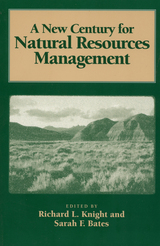
This book explores the changes that are leading to a new century of natural resources management. It places the current situation in historical perspective, analyzes the forces that are propelling change, and describes and examines the specific changes in goals, policy, and practice that are transforming all aspects of natural resources management.The book is an important overview for wildlife biologists, foresters, and others working for public land agencies; professors and students of natural resources; and all those whose livelihood depends on the use of public natural resources.
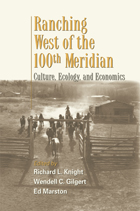
Recommended by The Nature Conservancy magazine.
Ranching West of the 100th Meridian offers a literary and thought-provoking look at ranching and its role in the changing West. The book's lyrical and deeply felt narratives, combined with fresh information and analysis, offer a poignant and enlightening consideration of ranchers' ecological commitments to the land, their cultural commitments to American society, and the economic role ranching plays in sustainable food production and the protection of biodiversity.
The book begins with writings that bring to life the culture of ranching, including the fading reality of families living and working together on their land generation after generation. The middle section offers an understanding of the ecology of ranching, from issues of overgrazing and watershed damage to the concept that grazing animals can actually help restore degraded land. The final section addresses the economics of ranching in the face of declining commodity prices and rising land values brought by the increasing suburbanization of the West. Among the contributors are Paul Starrs, Linda Hasselstrom, Bob Budd, Drummond Hadley, Mark Brunson, Wayne Elmore, Allan Savory, Luther Propst, and Bill Weeks.
Livestock ranching in the West has been attacked from all sides -- by environmentalists who see cattle as a scourge upon the land, by fiscal conservatives who consider the leasing of grazing rights to be a massive federal handout program, and by developers who covet intact ranches for subdivisions and shopping centers. The authors acknowledge that, if done wrong, ranching clearly has the capacity to hurt the land. But if done right, it has the power to restore ecological integrity to Western lands that have been too-long neglected. Ranching West of the 100th Meridian makes a unique and impassioned contribution to the ongoing debate on the future of the New West.
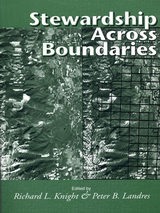
Every piece of land, no matter how remote or untrammeled, has a boundary. While sometimes boundary lines follow topographic or biological features, more often they follow the straight lines of political dictate and compromise. Administrative boundaries nearly always fragment a landscape, resulting in loss of species that must disperse or migrate across borders, increased likelihood of threats such as alien species or pollutants, and disruption of natural processes such as fire. Despite the importance and ubiquity of boundary issues, remarkably little has been written on the subject.
Stewardship Across Boundaries fills that gap in the literature, addressing the complex biological and socioeconomic impacts of both public and private land boundaries in the United States. With contributions from natural resource managers, historians, environmentalists, political scientists, and legal scholars, the book:
develops a framework for understanding administrative boundaries and their effects on the land and on human behavior examines issues related to different types of boundaries -- wilderness, commodity, recreation, private-public presents a series of case studies illustrating the efforts of those who have cooperated to promote stewardship across boundaries synthesizes the broad complexity of boundary-related issues and offers an integrated strategy for achieving regional stewardshi.
Stewardship Across Boundaries should spur open discussion among students, scientists, managers, and activists on this important topic. It demonstrates how legal, social, and ecological conditions interact in causing boundary impacts and why those factors must be integrated to improve land management. It also discusses research needs and will help facilitate critical thinking within the scientific community that could result in new strategies for managing boundaries and their impacts.
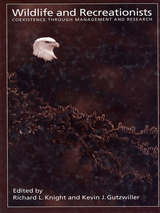
Wildlife and Recreationists defines and clarifies the issues surrounding the conflict between outdoor recreation and the health and well-being of wildlife and ecosystems. Contributors to the volume consider both direct and indirect effects of widlife-recreationist interactions, including:
- wildlife responses to disturbance, and the origins of these responses
- how specific recreational activities affect diverse types of wildlife
- the human dimensions of managing recreationists
- the economic importance of outdoor recreation
- how wildlife and recreationists might be able to coexist
READERS
Browse our collection.
PUBLISHERS
See BiblioVault's publisher services.
STUDENT SERVICES
Files for college accessibility offices.
UChicago Accessibility Resources
home | accessibility | search | about | contact us
BiblioVault ® 2001 - 2025
The University of Chicago Press




